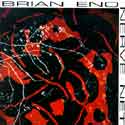![]()
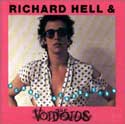 Richard Hell & the Voidoids - Blank Generation (1977)
Richard Hell & the Voidoids - Blank Generation (1977)
A seminal piece of early American punk. From the opening inverted tritones courtesy of Quine's caustic guitar, to the movement's anthem 'Blank Generation', this album served notice that punk rock wasn't just about thoughtless, misdirected anger. Combining Richard Hell's sarcastic, angst-ridden poetry with aggressive, off-kilter rhythms and grating guitars, punk was suddenly intelligent. Alongside the likes of the minimalist Ramones and pop/dance-oriented Blondie, the Voidoids stuck out like a sore middle finger.
;nbsp
Robert Quine (with Jody Harris) - Escape (1981)
A collaboration with ex-Raybeats guitarist Jody Harris, recorded in Quine's home studio. "One advantage to working at home: it's not $150.00 an hour, so if nothing happens, it's no big deal. You can watch the Three Stooges on TV." Indeed, all of the tracks on Escape are named after Three Stooges shorts. "It does sound pretty extreme now. It was my chance, after being constricted, to just go completely berserk with no regard for the listener. For example, the opening track, 'Flagpole Jitters', was designed to be offensive to most people."
;nbsp
 Richard
Hell & the Voidoids - Destiny Street (1982)
Richard
Hell & the Voidoids - Destiny Street (1982)
Recorded five years after the Voidoids' seminal Blank Generation, with drummer Fred Maher and guitarist Naux replacing the departed Marc Bell (who left the band to become Marky Ramone) and Ivan Julian, respectively. Somewhat less enthusiastically received than the Voidoids' debut album, Destiny Street is no less compelling a listen. Quine and Naux provide substantial guitar pyrotechnics to augment the new songs and covers. "I did backwards guitar, feedback guitar, speeded-up guitar. I got that out of my system for once and for all," Quine recalls. Standout tunes include 'The Kid With the Replaceable Head', 'Downtown at Dawn', 'Time', and 'Staring in Her Eyes'.
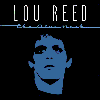 Lou
Reed - The Blue Mask (1982)
Lou
Reed - The Blue Mask (1982)
"That
album is totally unique. Lou just gave everybody a tape of the songs with
him playing acoustic guitar," Quine says. "I was literally free to come
up with whatever I wanted. Total freedom. We went in with no rehearsals. None
of us had ever played together before, but it just clicked immediately. What
you hear on the record is totally live. There are no overdubs, except on one
track. Any mistakes that happen are on the record. If I take a solo I stop
playing rhythm. It's the way they used to do things in the fifties. I'm especially
proud of that record.
"I think the feeling of The Blue Mask is closer to The Velvet Underground than anything, because of the droning effect. See, a lot of his songs are in D, so I dropped my tuning a whole step and came up with different voicings to match and complement his. The priority was to stick to open chords, because they just sound better. That drone was an essential feature of The Velvet Underground, and 'Women' and 'The Gun' were especially like that." Quine and Reed, on guitars, are joined by Fernando
Saunders (bass) and Doane Perry (drums).
;nbsp
 Robert
Quine (with Fred Maher) - Basic (1984)
Robert
Quine (with Fred Maher) - Basic (1984)
Recorded in Quine's home studio with Fred Maher, drummer on Richard Hell & the Voidoids' Destiny Street (1982) and Lou Reed's Legendary Hearts (1983) and Live in Italy (1984). "All my influences are in there, everything I know. Take the first track, 'Pickup', for example: It derives from 'Milkcow Blues Boogie' [from Elvis Presley's The Sun Sessions] - what Scotty Moore is doing. It's that same riff mutated and broken down. The chords behind it - that's The Byrds. I could go on and on. Even if they don't sound anything like Eno, the Eno influence is what caused me to leave a lot of those tracks alone. They're basic tracks with the textures already there."
;nbsp
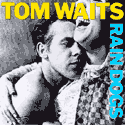 Tom
Waits - Rain Dogs (1985)
Tom
Waits - Rain Dogs (1985)
Quine plays on two songs: 'Blind Love' and 'Downtown Train' along with guitarists Keith Richards and G.E. Smith, respectively. "Some of the sessions were done with live musicians, but not with Keith Richards," Quine explains. "On the song you can really hear me on, 'Blind Love', I overdubbed to the basic track with a vocal on it - doing the little chord voicings on top and I guess Richards came in later, and you can hear him playing off me. On 'Downtown Train', G.E. Smith did the basic track, and I reinforced the rhythm part - the thudding rhythm guitar." Quine also played on a couple of tracks that did not make it onto the album.
;nbsp
"We went into the studio [in 1980] me, Bill Laswell, Fred Maher, and Eno. We worked for about two weeks, but Eno got disenchanted; that's when he decided to go off in the ambient direction. I was finally on an Eno record with Nerve Net. What he taught me about echo and sound and approaching recording was amazing." Quine plays on the track 'Juju Space Jazz', where he is credited with rhythm guitar and reverse guitars. Other contributors include Robert Fripp and John Paul Jones.
 John
Zorn - Film Works V: Tears of Ecstacy (1996)
John
Zorn - Film Works V: Tears of Ecstacy (1996)
Music recorded and mixed in twelve hours! Forty-eight sound cues (roughly one minute long each) for Tears of Ecstacy, a 1995 film by Japan's leading gay porno director, Oki Hiroyuki. Featuring Quine, Zorn, Marc Ribot and Cyro Baptista. This album mixes world beat, surf, hard rock, ambient, industrial, noise, classical and jazz.
 Corin
Curschellas - Valdun—Voices of Rumantsch (1997)
Corin
Curschellas - Valdun—Voices of Rumantsch (1997)
"Mark Ribot and I played on five tracks of the Valdun album in 1996 - it really is a masterpiece. Hard to find in the U.S., though. Subterranean Records in New York tries to keep it in stock." Entirely sung in Romansch, the distinctive language of Corin Curschellas' native Grisons - a rural confederation of peasant villages in the Swiss Alps. Featuring a collection of traditional and modern lyrics in a variety of musical styles.
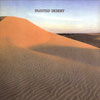 Ikue
Mori - Painted Desert (1997)
Ikue
Mori - Painted Desert (1997)
"[Mori] plays these drum pads, and Marc Ribot and I played guitar on top of that. He's really much better than I am, technically. [Producer] John Zorn decided it had a Southwestern feel, so it was called Painted Desert. We did it in two days, but on the second day I had clams for breakfast. ...We needed three days."
Richard Hell & the Voidoids - 'Oh' MUSICBLITZ.com (2000)
For the first time since 1977, Hell and the original Voidoids - Ivan Julain, Marc Bell, and Robert Quine - reunite to record a MUSICBLITZ.com exclusive song, 'Oh'.
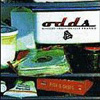 The Odds - Singles—Individually Wrapped (2000)
The Odds - Singles—Individually Wrapped (2000)
From the liner notes to The Odds' Singles—Individually Wrapped (concerning the song 'Jackhammer'): "Not many Odds songs feature guest artists, but this is one exception. During the Manhattan mixdown of Bed Bugs, we booked Warren Zevon to play some piano on "Yes/No" (coming up), and as he was leaving the session, [guitarist] Craig [Northey] said, "Check out my new guitar." Warren's sound check is on the left. Not long after, Robert Quine (Lou Reed, Matthew Sweet, others) stopped by for a coffee. He didn't want to play Craig's guitar, so he went home and got his own. We put his Stratocaster sting on the right. Craig must have really hit it with his lyric, a critique on alcoholic violence: a Canadian beer company named a brew after this song." Quine's credit reads: "Pain guitar".
